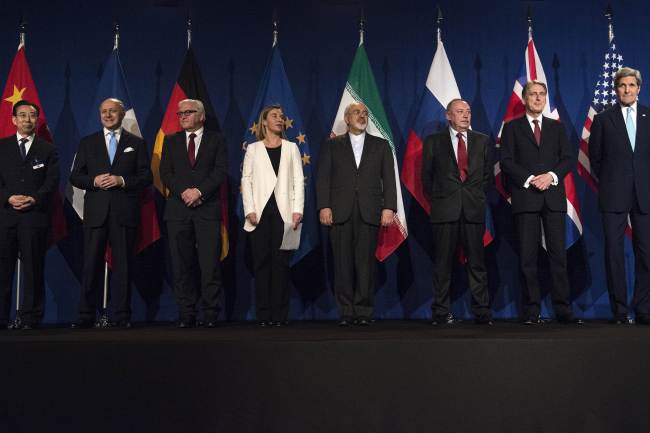In the wake of a historic deal between Iran and world powers, cautious optimism has been growing that North Korean denuclearization talks could move up Washington’s foreign policy agenda.
With U.S. President Barack Obama seeking to cement his diplomatic legacy, he could approach the Kim Jong-un regime afresh, buoyed by the latest agreement with Iran and ongoing efforts to normalize relations with Cuba.
But the prospect of a restart of negotiations appears gloomy, as the North remains steadfast in its nuclear ambitions.
Pyongyang is continuing work to beef up its nuclear and missile capabilities, which Obama has said posed a significant threat to not only South Korea, where some 28,500 U.S. troops are stationed, but also to other regions.
Obama has said he was willing to thaw relations with North Korea, Iran and Cuba shortly before he was sworn in in 2009. In a 2007 debate, he said it was “ridiculous” to think that “somehow not talking to countries is punishment to them which has been the guiding diplomatic principle of this administration.”
But skepticism persists over any fresh restart, given differences between North Korea and Iran in their progress in nuclear weapons development and economic and political situations. Pyongyang’s poor track record of keeping past pledges also tames hopes for a lasting deal.
“North Korea and Iran are vastly different in terms of the situations they face, the regions they are located, and their political and economic landscapes. North Korea is the sole country in the world that had joined and then backed out of the global nonproliferation regime, pressed ahead with the weapons program and asserted itself to be a nuclear weapons state,” a senior official at Seoul’s Foreign Ministry said, requesting anonymity.
“With five countries in the six-party forum closing gaps on conditions for exploratory talks, North Korea is throwing itself in a more difficult game by blaming South Korea and the U.S. for the current stalemate while not coming back to the negotiating table.”
The unruly regime has broken previous hard-won bilateral and multilateral agreements, namely the Agreed Framework sealed with the U.S. in Geneva in 1994; the six-party joint statement in 2005; and the so-called Leap Day Deal with the U.S. in February 2012. In 2003, it also walked away from the Nuclear Nonproliferation Treaty, an international accord aimed at preventing the spread of atomic weapons and related technology.
A first and foremost dampener is the North’s lack of commitment toward denuclearization. The regime has been promoting its parallel pursuit of nuclear and economic development, or the “byungjin line,” since Kim declared it as a top national priority in April 2012.
In a recent media interview, a North Korean diplomat serving the country’s mission to the U.N. said it would “never put down nuclear weapons first” and denuclearization was not open to negotiation, including the six-party talks involving the two Koreas, the U.S., China, Japan and Russia.
“Denuclearization is something that we may consider only after the rest of the world, including the U.S., is denuclearized,” the official was quoted as saying by the U.S.-funded broadcaster Voice of America on Wednesday.
Pyongyang has in recent months issued a string of statements to insist on developing what it calls nuclear deterrence.
The Rodong Sinmun, the mouthpiece of the North’s ruling Workers’ Party, also reported this week that Pyongyang would not drop the byungjin line, saying the policy would lead the country in a “direction of peace and prosperity.”
For the regime, however, the deal with Tehran may have far-reaching implications as it strives for relief from international sanctions which were enforced after arms tests and are choking its economy. It is expected to ramp up its pressure, leaving Pyongyang alone in countering Washington with nuclear threats.
Comparisons have long been rehashed between North Korea and Iran due chiefly to their nuclear ambitions and suspected covert partnership. Pyongyang has exported arms and dispatched experts and laborers to work in Iran’s nuclear facilities, while Tehran sent groups of engineers to observe and assist on long-range missile development in the North.
Yet while North Korea has publicly unveiled its military initiative, Iran remains an NPT member and argues that its nuclear program only has commercial, industrial and research purposes.
Pyongyang, an outlier in the interconnected global economy, apparently has a dozen crude nuclear devices, detonated them three times and claims to be on course to master miniaturizing warheads to mount on missiles. In contrast, whether Tehran has indeed achieved a “breakout” capability is still being hotly debated.
As North Korea views the weapons as pivotal for survival, forgoing them would require security guarantees. Iran’s primary goal was to be free from economic sanctions which has been crippling its resources-rich, trade-reliant economy.
Seoul welcomed the agreement on Friday, expressing hopes that it will lay the groundwork for an end to the Iranian nuclear issues. “We hope that this political settlement will contribute to regional peace and a stronger international nonproliferation regime,” the Foreign Ministry said in a statement.
During a meeting Thursday with U.S. House minority leader Nancy Pelosi, President Park Geun-hye cited the progress with Tehran to express regret that Pyongyang is facing away from the tide of change and sticking to its “path of isolation.”
“Despite many differences between the North Korean and Iranian nuclear issues, the newest breakthrough has big implications for the North Korean case in the way that the international community’s two-track endeavor ― pressure and dialogue ― has paid off,” Hwang Joon-kook, special representative for Korean Peninsular peace and security affairs at the ministry and Seoul’s chief nuclear negotiator, told reporters.
“I hope it will help form a positive mood for the resolution of the North Korean nuclear issue through negotiations including the six-party talks.”
By Shin Hyon-hee (
heeshin@heraldcorp.com)








